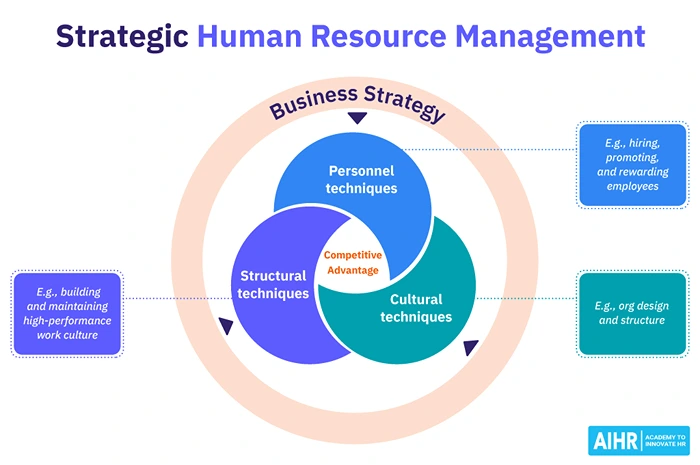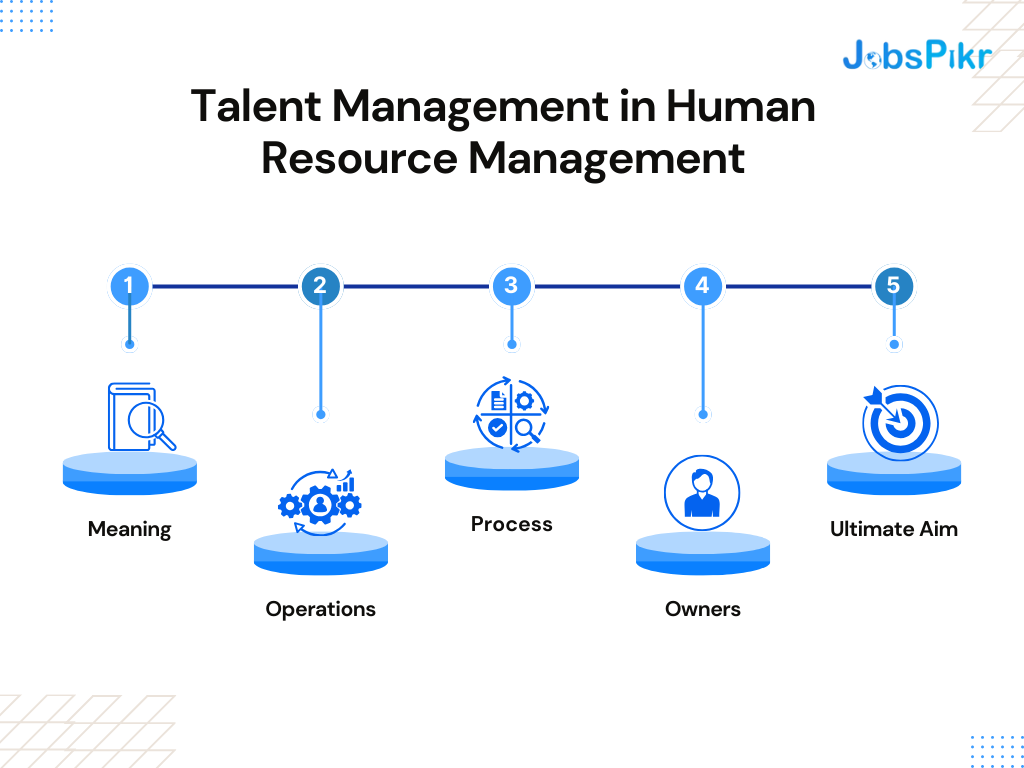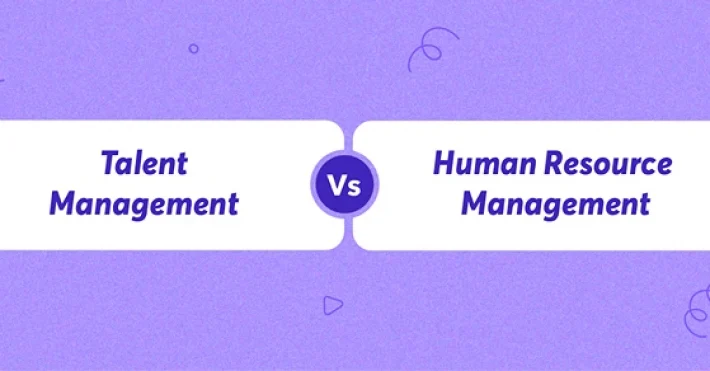Talent management is important for all organizations. In fact, you will find most of the company HR saying talent management in HR is one of their top priorities.
The terms Talent Management and Human Resources are always used interchangeably. However, they have different functions. In this article, we are going to learn about the difference between Talent Management and Human Resource Management in detail.
But before we move on to the differences, let’s understand what talent management means.
What is Talent Management?

A talent management stands as the cornerstone of organizational success, encompassing the holistic approach of attracting, recruiting, retaining, and developing individuals who drive the company toward its objectives. At its core, the talent management system integrates various critical facets of human resource management into a cohesive Talent management strategy tailored to the organization’s needs.
- Recruiting
- Onboarding
- Compensation planning
- Performance management
- Learning and development
- Succession planning
- Workforce planning
Talent management building a workforce and maintaining it to achieve your business goals. The talent management process involves the strategic development and maintenance of a skilled workforce in order to effectively achieve your business goals. So, you find talent management in HR department. It focuses on the systematic planned effort to attract, retain, and motivate highly-skilled managers and employees. They do this by cultivating a stable workforce thriving in the value system of the organization while filling the gaps with new skills and perspectives.
What is the Importance of Talent Management Process and Talent Strategy?
Incorporating a robust talent management system and talent strategy is indispensable for organizational triumph. A meticulously crafted talent management process serves as the linchpin, harmonizing recruitment, performance evaluation, and development endeavors, thereby facilitating the seamless execution of talent management initiatives.
Talent strategy, on the other hand, entails a strategic alignment of talent management in hr and its efforts with overarching business objectives, ensuring that the organization’s workforce is finely tuned to propel success. Crafting a unified talent strategy empowers proactive talent acquisition, precision-targeted skill enhancement, and nimble succession planning, thereby fortifying the organization’s competitive prowess.
Performance Management: Maximizing Employee Potential
Performance management emerges as a cornerstone within the domain of talent management, embodying a methodical approach to establishing expectations, delivering constructive feedback, and nurturing employee growth to amplify their effectiveness and contribution towards organizational objectives.
Effective performance management entails establishing clear objectives aligned with the company’s mission and vision, conducting regular evaluations to assess progress, offering constructive feedback, and implementing strategies for skill enhancement and career advancement. By prioritizing performance management, organizations can cultivate a culture of accountability, motivation, and continuous improvement among their workforce, ultimately driving sustainable success.
What is Human Resource Management?

Image Source: aihr.com
Human resource management is the administrative part that delivers core HR requirements and services to the organization. The responsibilities include the daily operation of the human resource department and the process of dictating every employee in the organization on a daily basis.
Each employee in the organization has to deal with HR at some point. It might be the interview, onboarding, training, or some personal problems that might arise within the office. So, the human resource department plays a vital role in the success of the organization.
HR managers have supervisory responsibilities in the HR department. But they work with other departments to recognize the personal requirements to help them identify the right candidate for the work.
HR specialists in the HR departments might focus on administrative and executive actions, such as creating compensation packages for all employees, maintaining safety and compliance policies, administrative benefits, overseeing career training, and proper employee data management.
Based on the size of the organization, job titles might go beyond human resource specialists and human resources managers to reflect the responsibilities held by the members of the HR department.
Talent Management in Human Resource Management
Once you know the difference between human resources and talent management, you will know why organizations are defining titles within a company. It can establish clear goals and set up the team.
Here are some of the key differences between talent management and human resource.

- Meaning
All things related to the people in the company are human resource management. it includes everything, starting from the total people to be hired to how to retain them.
Talent management, on the other hand, is the process to nurture, develop, and retain talent in the company.
- Operations
Operations are the core function of human resources. It handles managing benefits, pay structures, holiday calendars, policy creation, and disputes.
But talent management recognizes the potential in the employees and works on them to improve them through training, reviews, or coaching.
- Process
Human resource is a separate business process. However, it should be noted that the talent management process is interconnected with various other business activities and processes within a company.
- Owners
The HRM processes in an organization are taken care of by the HR department and the management doesn’t interfere in this. On the other hand, talent management requires managers, leaders, and employees to work together and identify their potential, mentor them, and recommend training. They also review the progress they make.
- Ultimate Aim
The ultimate aim of HRM is to hire talent and make the best out of it to achieve organizational goals. But talent management concentrates more on making the most of the aspects of making the most out of them.
Bringing Together Talent Management and Human Resources
Strategy can drive execution. This is the relation between human resource management and talent management. Strategy in talent management can briefly define the decisions and actions taken by core members of the HR team.
But you shouldn’t take talent management as an alternative to human management. They are two different approaches to a single process. You have the choice to do one over the other. Every business needs to do both. So, you can say talent management in HR is an important thing for any organization.
For leveraging employee talent for optimum success, the most important asset of the organization and talent has to be integrated into the responsibilities and approach of the HR department.
In case it fails to do so, it can cause employees to underperform. So, the organization will be unable to achieve its goals. Moreover, the talent you recruited might look for greener pastures.
Don’t forget, if a company fails to identify and encourage its employees, other companies surely will.
What sounds simple at the surface is pretty complicated. Starting from recruiting to employee training is a part of talent management. Moreover, not having a blueprint of the success of talent management makes matters worse. So, the strategy that will work for a small diner might not be suitable for an IT firm.
Talent Management is Here to Stay
In human resources, people generally find trends thrown at them as the next big thing. However, it only gets replaced by the next big thing some years later. This is not the case with talent management in HR. It is the holistic people strategy that dictates an organization’s success. It will only make the impact felt in grappling times. In case you haven’t yet sat down with the stakeholders to formulate a combination of process strategy, structure, and technology to be successful with talent management, it is the right time to start.
Empower your HR and talent strategies with real-time data insights, sign up with JobsPikr today to stay ahead in the competitive job market.
FAQ
Why is Talent Management Important?
Talent management holds pivotal significance for various reasons:
- Promotes Competitive Edge: Strong talent management strategies attract, develop, and retain top talent, providing a competitive edge.
- Boosts Engagement: Effective talent management in HR fosters value and engagement among employees.
- Drives Growth: Aligned talent accelerates company growth and adapts to market changes.
- Supports Succession: Talent management identifies and nurtures future leaders.
- Nurtures Dynamic Culture: A talent-focused environment enhances capabilities and organizational culture.
What is an example of talent management?
An exemplary model of talent management is seen in the utilization of a tool like Jobspikr. With Jobspikr, companies can strategically enhance their recruitment processes by accessing a vast and up-to-date repository of job data from across the web. This tool enables organizations to:
- Identify current hiring trends and demands in the job market
- Analyze skill requirements across various industries
- Tailor talent acquisition strategies to secure top candidates efficiently
- Maintain competitiveness by adjusting to the evolving workforce environment
Utilize Jobspikr’s data to inform decision-making, positioning your business to effectively attract and retain top talent.
What is the difference between HR and talent management?
Human resources (HR) and talent management are frequently mistaken for one another, despite their distinct focuses within workforce strategy. HR encompasses a wider array of duties, which include:
- Compliance with labor laws and regulations
- Payroll and benefits administration
- Employee relations and conflict resolution
- Overseeing organizational policies and procedures
In contrast, talent management is a subset of HR that specifically targets the attraction, development, and retention of top talent, with activities including:
- Talent acquisition and recruitment strategies
- Employee development programs and career pathing
- Succession planning and leadership development
- Performance management systems to foster high achievers



